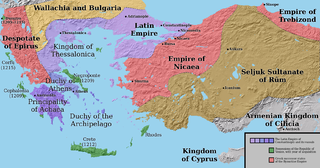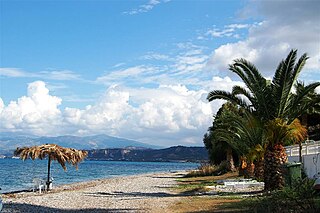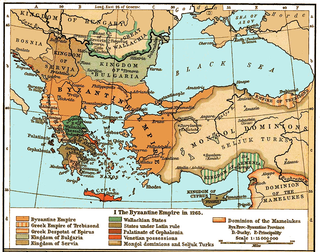 W
WThe Principality of Achaea or Principality of Morea was one of the three vassal states of the Latin Empire, which replaced the Byzantine Empire after the capture of Constantinople during the Fourth Crusade. It became a vassal of the Kingdom of Thessalonica, along with the Duchy of Athens, until Thessalonica was captured by Theodore, the despot of Epirus, in 1224. After this, Achaea became for a while the dominant power in Greece.
 W
WAndravida is a town and a former municipality in Elis, in the northwest of the Peloponnese peninsula of Greece. Since the 2011 local government reform it is part of the municipality Andravida-Kyllini, of which it is a municipal unit. The municipal unit has an area of 40.728 km2. Its population is about 4,300. The town was the capital of the Frankish Principality of Achaea in the late Middle Ages.
 W
WCorinth was a city-state (polis) on the Isthmus of Corinth, the narrow stretch of land that joins the Peloponnese to the mainland of Greece, roughly halfway between Athens and Sparta. The modern city of Corinth is located approximately 5 kilometres (3.1 mi) northeast of the ancient ruins. Since 1896, systematic archaeological investigations of the Corinth Excavations by the American School of Classical Studies at Athens have revealed large parts of the ancient city, and recent excavations conducted by the Greek Ministry of Culture have brought to light important new facets of antiquity.
 W
WThe Fourth Crusade (1202–1204) was a Latin Christian armed expedition called by Pope Innocent III. The stated intent of the expedition was to recapture the Muslim-controlled city of Jerusalem, by first conquering the powerful Egyptian Ayyubid Sultanate, the strongest Muslim state of the time. However, a sequence of economic and political events culminated in the Crusader army's 1204 Sack of Constantinople, the capital of the Greek Christian-controlled Byzantine Empire, rather than Egypt as originally planned.
 W
WAlissos is a village and a community in the municipal unit of Dymi, Achaea, Greece. It is located near the Gulf of Patras, 3 km east of Kato Achaia, 3 km southwest of Kaminia and 17 km southwest of Patras. The community consists of the villages Alissos, Kamenitsa, Paralia Alissou and Profitis Elissaios. The Greek National Road 9 and the railway from Patras to Pyrgos run between Alissos and Paralia Alissou.
 W
WThe Lordship of Salona, after 1318 the County of Salona, was a Crusader state established after the Fourth Crusade (1204) in Central Greece, around the town of Salona.
 W
WPontikokastro, known in French as Beuvoir and Italian as Belveder during the late Middle Ages, is a Byzantine castle in Agios Andreas, Katakolo, in the Peloponnese peninsula of Greece.
 W
WThe War of the Euboeote Succession was fought in 1256–1258 between the Prince of Achaea, William II of Villehardouin, and a broad coalition of other rulers from throughout Frankish Greece who felt threatened by William's aspirations. The war was sparked by William's attempt to gain control of a third of the island of Euboea, which was resisted by the local Lombard barons with the aid of the Republic of Venice. The Lord of Athens and Thebes, Guy I de la Roche, also entered the war against William, along with other barons of Central Greece. Their defeat at the Battle of Karydi in May/June 1258 effectively brought the war to an end in an Achaean victory, although a definite peace treaty was not concluded until 1262.
 W
WZaraka Monastery is a ruined Frankish abbey near Stymfalia, in the Peloponnese, in Greece. It was built about a kilometre from the shores of Lake Stymphalia, the site of the ancient city of Stymphalus, during the "Frankokratia", i.e. the occupation of parts of the Byzantine Empire by Franks and Venetians, following the events of the Fourth Crusade in 1204, and the establishment of the Latin Empire of Constantinople and Greece.